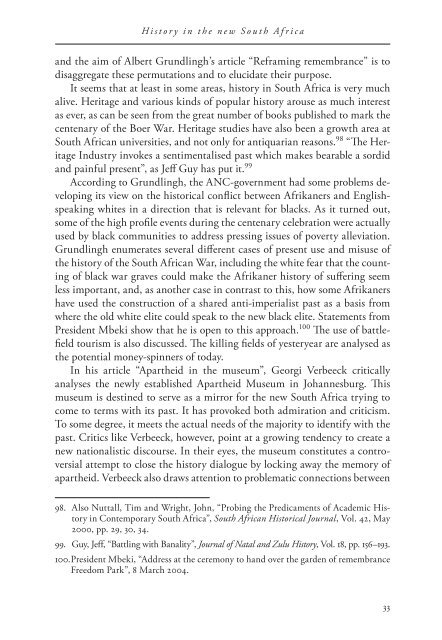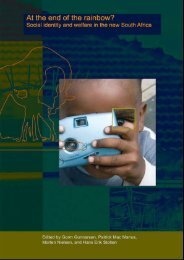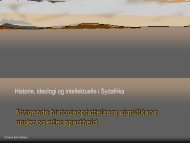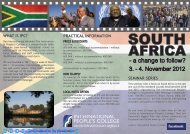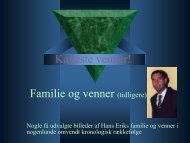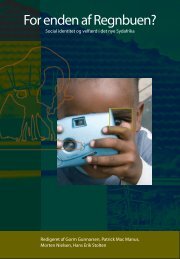History Making and Present Day Politics - Stolten's African Studies ...
History Making and Present Day Politics - Stolten's African Studies ...
History Making and Present Day Politics - Stolten's African Studies ...
You also want an ePaper? Increase the reach of your titles
YUMPU automatically turns print PDFs into web optimized ePapers that Google loves.
H i s t o r y i n t h e n e w S o u t h A f r i c a<br />
<strong>and</strong> the aim of Albert Grundlingh’s article “Reframing remembrance” is to<br />
disaggregate these permutations <strong>and</strong> to elucidate their purpose.<br />
It seems that at least in some areas, history in South Africa is very much<br />
alive. Heritage <strong>and</strong> various kinds of popular history arouse as much interest<br />
as ever, as can be seen from the great number of books published to mark the<br />
centenary of the Boer War. Heritage studies have also been a growth area at<br />
South <strong>African</strong> universities, <strong>and</strong> not only for antiquarian reasons. 98 “The Heritage<br />
Industry invokes a sentimentalised past which makes bearable a sordid<br />
<strong>and</strong> painful present”, as Jeff Guy has put it. 99<br />
According to Grundlingh, the ANC-government had some problems developing<br />
its view on the historical conflict between Afrikaners <strong>and</strong> Englishspeaking<br />
whites in a direction that is relevant for blacks. As it turned out,<br />
some of the high profile events during the centenary celebration were actually<br />
used by black communities to address pressing issues of poverty alleviation.<br />
Grundlingh enumerates several different cases of present use <strong>and</strong> misuse of<br />
the history of the South <strong>African</strong> War, including the white fear that the counting<br />
of black war graves could make the Afrikaner history of suffering seem<br />
less important, <strong>and</strong>, as another case in contrast to this, how some Afrikaners<br />
have used the construction of a shared anti-imperialist past as a basis from<br />
where the old white elite could speak to the new black elite. Statements from<br />
President Mbeki show that he is open to this approach. 100 The use of battlefield<br />
tourism is also discussed. The killing fields of yesteryear are analysed as<br />
the potential money-spinners of today.<br />
In his article “Apartheid in the museum”, Georgi Verbeeck critically<br />
analyses the newly established Apartheid Museum in Johannesburg. This<br />
museum is destined to serve as a mirror for the new South Africa trying to<br />
come to terms with its past. It has provoked both admiration <strong>and</strong> criticism.<br />
To some degree, it meets the actual needs of the majority to identify with the<br />
past. Critics like Verbeeck, however, point at a growing tendency to create a<br />
new nationalistic discourse. In their eyes, the museum constitutes a controversial<br />
attempt to close the history dialogue by locking away the memory of<br />
apartheid. Verbeeck also draws attention to problematic connections between<br />
98. Also Nuttall, Tim <strong>and</strong> Wright, John, “Probing the Predicaments of Academic <strong>History</strong><br />
in Contemporary South Africa”, South <strong>African</strong> Historical Journal, Vol. 42, May<br />
2000, pp. 29, 30, 34.<br />
99. Guy, Jeff, “Battling with Banality”, Journal of Natal <strong>and</strong> Zulu <strong>History</strong>, Vol. 18, pp. 156–193.<br />
100. President Mbeki, “Address at the ceremony to h<strong>and</strong> over the garden of remembrance<br />
Freedom Park”, 8 March 2004.<br />
33


